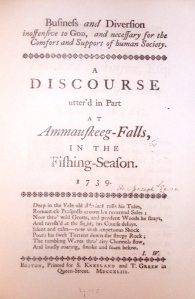In 1739, Anglican minister and avid sport fisherman Joseph Seccombe delivered a sermon on the religious justification of recreation, particularly fishing, at Amoskeag Falls, in New Hampshire. Published later, in 1743, the sermon would become the first document published in the American colonies dealing with these subjects. The sermon is now known by the title, Business and diversion inoffensive to God, and necessary for the comfort and support of human society. A discourse utter’d in part at Ammauskeeg-Falls, in fishing season. 1739.
Following is an excerpt from the sermon:
But here, in Fishing, we are so far from delighting to see our Fellow-Creature die, that we hardly think whether they live—— We have no more of a murderous Tho’t in taking them, than in cutting up a Mess of Herbage. We are taking something, which God, the Creator and Proprietor of all, has given us to use for Food, as freely as the green Herb. Gen. ix. 2, 3.
He allows the eating them, therefore the mere catching them is no Barbarity. Besides God seems to have carv’d out the Globe on purpose for a universal Supply: In Seas, near Shores, are Banks and Beds made for them; ——to furnish the Lands adjacent——and Lands which lye remote, are more divided into Lakes and Ponds, Brooks, and Rivers; and he has implanted in several Sorts of Fish, a strong Instinct [or inclination] to swim up these Rivers a bast Distance from the Sea. And is it not remarkable, that Rivers most incumbered with Falls, are ever more full of Fish than others. Why are they directed here? Why retarded by these difficult Passages? But to supply the Inlands? Does forming and disposing of these Things argue nothing? (16-17).
Seccombe was undoubtedly familiar with fellow Anglican writer, Issac Walton, who wrote of the presence of the Christian God in nature several decades earlier and whose book, The Compleat Angler, or, The Contemplative Man’s Recreation (1653) remained in print. Still, Seccombe is relatively unique, as a writer in North America, in describing the wilds as possessing God-given value. It appears that he even wrote letters, filled with observations of “nature,” to superior members of the Anglican Communion.
On the other hand, Seccombe clearly places little intrinsic value upon those beings that inhabit the wilds about him. Here, he is not so unique. It took well over one hundred more years for American anglers to realize, as a whole, that their activities were impacting fish populations negatively. And it took them well over one hundred years beyond that for them to engage in concerted conservation efforts. No doubt, Seccombe would have been engaged in such efforts, himself, had he realized the impact his fishing would have upon the salmon and trout that he hunted. He is to be admired, however, for advocating that his listeners and readers appreciate the natural world around them, and to do so with religious seriousness. That, at least, was a first, very early step toward conservation.

February 25, 2012 at 12:22 AM |
Great post!
LikeLike